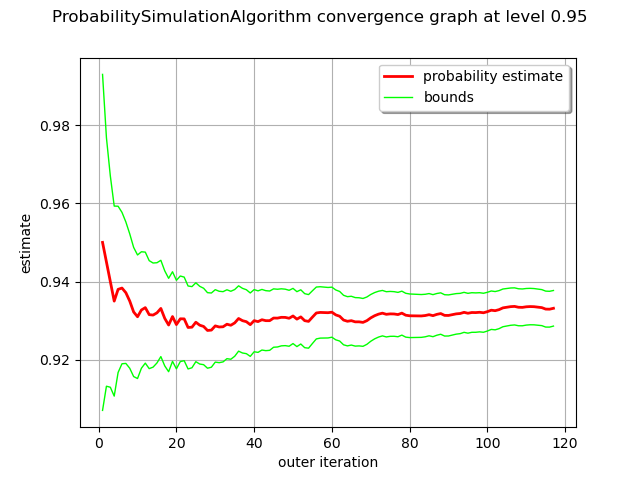Note
Click here to download the full example code
Estimate a process event probability¶
The objective of this example is to evaluate the probability of an event based on a stochastic process, using the Monte Carlo estimator.
Let be a stochastic process
of dimension
, where
is discretized on the mesh
.
We define the event as:
where is a domain of
.
We estimate the probabilty with the Monte Carlo
estimator.
The Monte Carlo algorithm is manipulated the same way as in the case where the event is based on a random variable independent of time.
We illustrate the algorithm on the example of the bidimensionnal white
noise process where
, distributed according to the bidimensionnal standard
normal distribution (with zero mean, unit variance and independent
marginals).
We consider the domain . Then the event
writes:
For all time stamps , the probability
that the process
enters into the domain
at time
writes, using the independence
property of the marginals:
with the cumulative distribution function of the scalar standard Normal distribution.
As the proces is discretized on a time grid of size and using the
independance property of the white noise between two different time
stamps and the fact that the white noise follows the same distribution
at each time
, the final probability
writes:
With realizations, using the Monte Carlo estimator, we obtain
,
to be compared to the exact value
for a time grid of size
.
from __future__ import print_function
import openturns as ot
import openturns.viewer as viewer
from matplotlib import pylab as plt
ot.Log.Show(ot.Log.NONE)
Create a time grid
tMin = 0.0
timeStep = 0.1
n = 100
tgrid = ot.RegularGrid(tMin, timeStep, n)
Create a normal process
amplitude = [5.0]
scale = [3.0]
model = ot.ExponentialModel(scale, amplitude)
process = ot.GaussianProcess(model, tgrid)
Create the 1-d domain A: [2.,5.]
lowerBound = [2.0]
upperBound = [5.0]
domain = ot.Interval(lowerBound, upperBound)
Create an event from a Process and a Domain
event = ot.ProcessEvent(process, domain)
Create the Monte-Carlo algorithm
montecarlo = ot.ProbabilitySimulationAlgorithm(event)
# Define the maximum number of simulations
montecarlo.setMaximumOuterSampling(1000)
# Define the block size
montecarlo.setBlockSize(100)
# Define the maximum coefficient of variation
montecarlo.setMaximumCoefficientOfVariation(0.0025)
# Run the algorithm
montecarlo.run()
# Get the result
montecarlo.getResult()
probabilityEstimate=9.331624e-01 varianceEstimate=5.384142e-06 standard deviation=2.32e-03 coefficient of variation=2.49e-03 confidenceLength(0.95)=9.10e-03 outerSampling=117 blockSize=100
graph = montecarlo.drawProbabilityConvergence(0.95)
view = viewer.View(graph)
plt.show()

Total running time of the script: ( 0 minutes 0.198 seconds)
 OpenTURNS
OpenTURNS